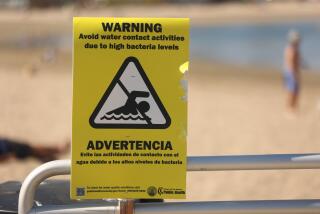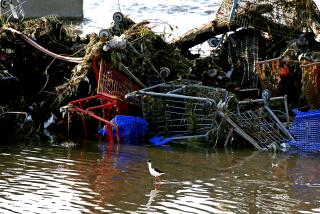Swimming in bacteria
- Share via
The cool and inviting water of your favorite swimming pool may not be as clean and safe as it looks. It may be a breeding ground for the kind of bacteria responsible for the increasing incidence of “recreational water illnesses,” mostly gastroenteritis.
More than half of the 22,000 public pools inspected last summer in six areas across the country, including Los Angeles, had at least one violation. Children’s wading pools were the worst: 18.4% had a serious lapse in maintenance. The next worst were pools used for medical therapy, followed by pools at hotels and motels.
According to a Centers for Disease Control and Prevention analysis, 8.3% of pools had such serious violations that they had to be closed immediately. Most violations involved inadequate maintenance of chlorine and pH levels or filtration and water recirculation problems.
“Public health inspectors can’t be at the pool every day, so we have to rely on pool operators to maintain them,” CDC epidemiologist Michael Beach says. And pool operators are part of the problem, particularly in apartment and condominium complexes. Inspections of these pools found that many operators did not have appropriate certification.
No matter how well-maintained you think your favorite pool is, federal health officials suggest some common sense safety measures: Don’t swim if you are sick with diarrhea. Don’t swallow pool water. And don’t let a child wade in the water with a soiled diaper.
For more information on reducing the spread of water illnesses, go to www.cdc.gov/healthyswimming.
This study was published in the June 6 issue of the CDC’s Morbidity and Mortality report.






